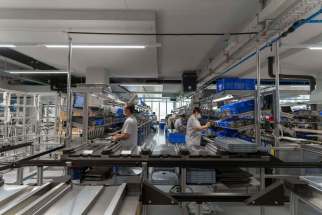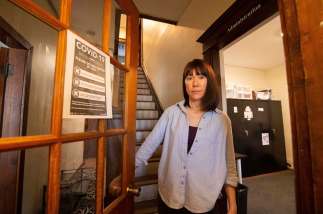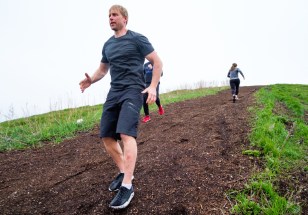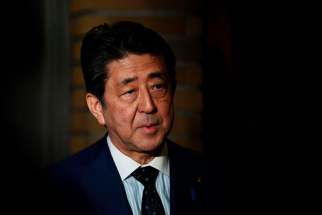Demand storm for ventilators Winnipeg company swamped by demand as pandemic rages
Read this article for free:
or
Already have an account? Log in here »
To continue reading, please subscribe:
Monthly Digital Subscription
$0 for the first 4 weeks*
- Enjoy unlimited reading on winnipegfreepress.com
- Read the E-Edition, our digital replica newspaper
- Access News Break, our award-winning app
- Play interactive puzzles
*No charge for 4 weeks then price increases to the regular rate of $19.00 plus GST every four weeks. Offer available to new and qualified returning subscribers only. Cancel any time.
Monthly Digital Subscription
$4.75/week*
- Enjoy unlimited reading on winnipegfreepress.com
- Read the E-Edition, our digital replica newspaper
- Access News Break, our award-winning app
- Play interactive puzzles
*Billed as $19 plus GST every four weeks. Cancel any time.
To continue reading, please subscribe:
Add Free Press access to your Brandon Sun subscription for only an additional
$1 for the first 4 weeks*
*Your next subscription payment will increase by $1.00 and you will be charged $16.99 plus GST for four weeks. After four weeks, your payment will increase to $23.99 plus GST every four weeks.
Read unlimited articles for free today:
or
Already have an account? Log in here »
Hey there, time traveller!
This article was published 24/03/2020 (2094 days ago), so information in it may no longer be current.
A little known Winnipeg company called Bomimed has found itself in the middle of the demand storm across the country for critical care ventilator equipment that even its own pandemic plan did not imagine.
Bomimed is the exclusive Canadian distributor for the Swiss company, Hamilton Medical, one of the world’s leading ventilator manufacturers.
Not only does Bomimed do all the sales, servicing, installation and clinical support, it makes all the hoses and breathing circuitry at the company’s Fort Garry plant.
“I have never imagined anything like this happening in my lifetime,” said David Olivier, owner of Bomimed.
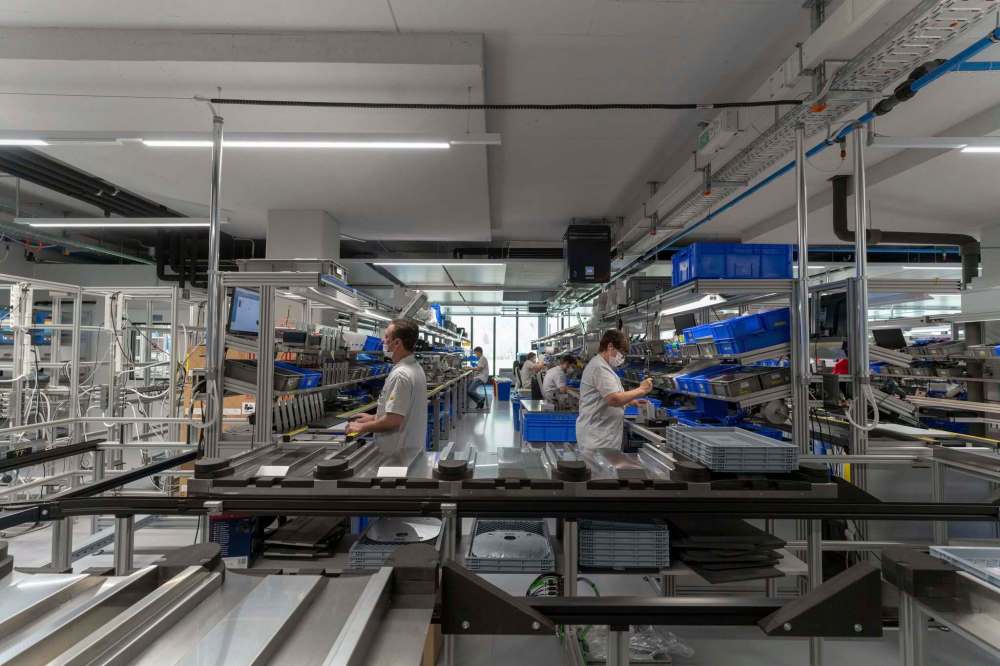
He said he and 75 staff are working into the wee hours of the night trying to keep up with demand.
The company has multiple orders from hospitals across the country. But Olivier said the scary thing is, that even though Hamilton Medical has pledged to double its production by the end of the year — it had been making about 220 ventilators per week — there will still be a four-month wait for any Canadian hospital’s delivery.
“And that three to four months can turn into six or eight months,” Olivier said, referring to the unprecedented global distribution challenges that have to be addressed.
Because not only has demand superseded all normal conditions, the actual distribution logistics are now impossibly difficult.
“I have never imagined anything like this happening in my lifetime.” – David Olivier
“We have never experienced anything like this before, with borders closed all around the world,” Olivier said. “We’ve already had shipments stuck at port. We normally ship things by air on passenger planes but now all the airlines have shut down it is a challenge.”
Olivier is in daily contact with Bob Hamilton of Hamilton Medical and with senior government and airline officials. For instance, he has been told by senior Air Canada people that he will have access to humanitarian flights and Government of Canada planes if needed.
“I have been in contact with every government agency you can think of,” he said. “We have outstanding orders for ventilator from coast to coast, province to province, hospital to hospital. We are inundated. We actually had a pandemic plan but this has blown everything out of the water.”
Oxygen sanitizing spray bottle in huge demand
Kevin Shale has always been focused on sustainability as an entrepreneur.
When the young Winnipeg entrepreneur, who is a member of North Forge Technology Exchange, heard about a product out of the U.S. that turns simple tap water into nature’s most powerful sanitizer, he spent about four years securing the Canadian rights and developing the market in this country.
For the past year he was talking with industry about using the device, called the EnozoPRO activated oxygen sanitizing spray bottle, and talking to Canadian industry about its usage.
Kevin Shale has always been focused on sustainability as an entrepreneur.
When the young Winnipeg entrepreneur, who is a member of North Forge Technology Exchange, heard about a product out of the U.S. that turns simple tap water into nature’s most powerful sanitizer, he spent about four years securing the Canadian rights and developing the market in this country.
For the past year he was talking with industry about using the device, called the EnozoPRO activated oxygen sanitizing spray bottle, and talking to Canadian industry about its usage.
Then the pandemic hit, hand sanitizer was sold out everywhere and everyone wanted to buy one of the US$500 bottles.
He sold right out in days.
“Literally the day after the World Health Organization called the COVID-19 coronavirus a pandemic my phone started ringing off the hook,” Shale said.
His company, Montra Canada, is expecting another shipment in about three weeks.
He has been talking to federal government officials about allowing the distribution of that shipment to be deployed to the most vulnerable.
“It’s not about trying to capture all the business now. It’s really all about how can we help,” he said. “We want the product to go to where the need is the highest, not to who is screaming the loudest just because they are worried, but who is really overloaded.”
Shale is one of many Winnipeg businesses that have made it known they want to help in the COVID-19 containment effort.
For instance, Kerry Stevenson, one of the founders of North Forge’s fabrication lab who is an international authority on 3D printing, talked to many people about using that technology to help make medical devices. But Stevenson said they quickly realized that the technology is really not suitable for the quality standards for the medical device setting.
Tom Tessier, whose company Solara makes durable wireless communication devices, got a group together to see what could be made. He has put together a proposal to make face shields.
Tracy Maconachie, president of Bioscience Association Manitoba, has been talking with Shared Health to see how Manitoba companies might be able to help with the cause.
Shale didn’t realize his business would become part of the effort. When there was an abundance of other sanitizer available on the market, the EnozoPRO was just a safer, better, more sustainable alternative solution to the status quo.
“We had no way to anticipate that our environmental direction would become more of a supply and demand thing,” he said
As the company waits for shipments — Bomimed’s inventory has been decimated — the company is furiously trying to convert some of its production lines that had been used to produce hoses and components for anesthesia equipment that it also distributes.
Olivier said Bomimed engineers have created specially designed circuitry that can be used for COVID-19 patients taking into account the severity of the patients’ condition as well as the bio-security for the health care professionals who would be operating the equipment.
Ventilators range in price from $18,000-to-$20,000 for portable ones to $70,000 for the most sophisticated models.
Hamilton Medical has stated that it will hold all its prices at normal rates — “We denounce any opportunistic utilization of this humanitarian crisis, including a raise in prices. Our prices will remain the same as before the coronavirus outbreak,” it says on its website.
Olivier said with the pandemic conditions changing so rapidly, he intends to be able to supply ventilators to the hospitals where the need is the greatest.
“That is what we going to fight for,” he said. “It is not an easy task right now. We are doing everything we can.”
martin.cash@freepress.mb.ca
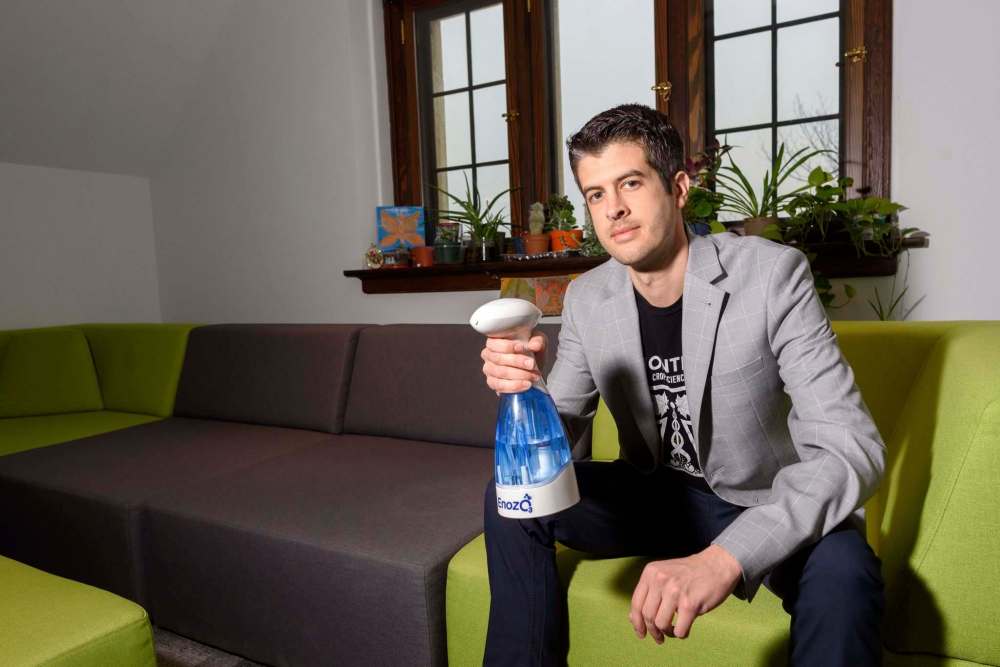

Martin Cash has been writing a column and business news at the Free Press since 1989. Over those years he’s written through a number of business cycles and the rise and fall (and rise) in fortunes of many local businesses.
Our newsroom depends on a growing audience of readers to power our journalism. If you are not a paid reader, please consider becoming a subscriber.
Our newsroom depends on its audience of readers to power our journalism. Thank you for your support.
History
Updated on Tuesday, March 24, 2020 8:27 PM CDT: hyphenates covid-19
Updated on Tuesday, March 24, 2020 8:35 PM CDT: final edit, fixes



